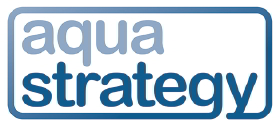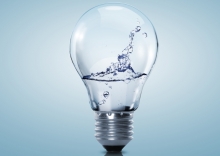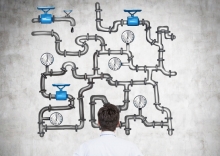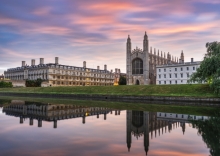Issue:
Innovation will be one of the regular themes of Aqua Strategy. To introduce our coverage, Keith Hayward takes a look at how water is featuring in the latest round of funding under Europe’s Horizon 2020 initiative. This aims to do more than just support research and development: it is putting huge sums of money into technologies that will find commercial success and support Europe’s competitiveness globally.

Water has featured prominently in the support the European Union provides to research and development. In particular, the Seventh Framework Programme, which ran to 2013, had a substantial focus on water. This was followed by a strong water theme within the first two years of the subsequent initiative: the huge Horizon 2020 programme – with its support totalling some €80 billion over its lifetime from 2014 to 2020.
Horizon 2020 is hailed as the European Union’s biggest research and innovation programme ever. Its aim is not simply to identify issues for which progress is needed and to provide support to research efforts on these issues. It is the financial instrument implementing a flagship initiative aiming to secure Europe’s global competitiveness.
The latest tranche of calls for project proposals under Horizon 2020 began at the start of this year, running from 2016-2017. On the face of it, water does not feature as prominently during this period. But amongst the topics due to be covered, there are clear opportunities for those working in the water sphere to tap into EU funding.
Funding for climate action
Horizon 2020 is split into a number of ‘sections’ around which funding is structured, including excellent science, industrial leadership, and societal challenges. Seven societal challenges are addressed, including energy, transport, health, social issues and security.
Where water features in particular is in the societal challenge covering climate action, environment resource efficiency and raw materials. Climate action is mainstreamed in Horizon 2020 and overall expenditure should be more than 35% of the total Horizon 2020 budget. Water is one of the main focus areas of this area, and according to the EU website, the aim is to boost EU competitiveness, growth and jobs in the water sector, and to position Europe as a global market leader in water-related innovative solutions.
The 2016-2017 round of submissions, or call, on climate, resources and raw materials is dubbed ‘Greening the economy’. It includes funding to develop the concept of climate services (package SC5-01-2016-2017) and to develop an integrated European regional modelling and climate prediction system (SC5-02-2017). Support for efforts to progress nature-based solutions include a package for large-scale demonstrations of nature-based solutions to reduce hydro-meteorological risk, to contribute to the EU’s position as a recognised leader (SC5-08-2017).
Packages specifically targeting water include support to extend Europe’s intergovernmental Water Joint Programming Initiative to international cooperation (SC5-11-2016).
Food security
Water also features prominently in another of the societal challenges, that dealing with food and agriculture.
The call on sustainable food security (H2020-SFS-2016-2017), has a focus on improving resilience in primary food production. Topics getting support include efficient use of water in crop production, and the use of robotics in farming.
The related call on ‘blue growth’ (H2020-BG-2016-2017) is focused on economic development around the use of ocean resources. This includes a package on algal biomass biorefineries that could cover fresh water algae (BG-01-2016) and one on clean coasts and seas that includes the issue of microplastics (BG-07-2017).
A further call, on ‘rural renaissance’ (H2020-RUR-2016-2017), includes for example a package on ‘water farms’ – case studies of good practices in drinking water management involving improved farming systems and land use management (RUR-04-2016).
Energy and critical infrastructure security
Security is another of the societal challenges in Horizon 2020, and there are some notable issues receiving attention as far as water is concerned.
There is a package focused on prevention, detection, response and mitigation of the combination of physical and cyber threats to the critical infrastructure of Europe, with water systems included in the critical infrastructures (CIP-01-2016-2017).
Another package is to look at the detection of explosive precursors and illegal drugs in sewage networks and air quality monitoring networks, looking at the integration of detection capabilities and data fusion with utility providers’ networks (SEC-10-FCT-2017). For this, participation of utilities and law enforcement agencies is sought, with one sewer network of over one million and another serving 100,000-300,000.
Energy is a societal challenge too, with a focus on efficiency and low-carbon sources. A package on waste heat recovery and reuse in heating and cooling systems is to include a demonstration of wastewater heat recovery (EE-01-2017). Another is to look at near-to-market solutions for reducing the water consumption of concentrated solar power plants, where water consumption remains a crucial barrier to deployment in arid areas (LCE-11-2017).
Cities, industry, efficient buildings, and the circular economy
Water spans a good number of the other parts of the Horizon 2020 programme too. Support in the area of industrial leadership includes efforts on nanotechnology, advanced manufacturing and biotechnology, for example, including packages such as the development of near zero energy building renovation (EEB-05-2017), and the bioconversion of non-agricultural wastes, including wastewater treatment waste, into biomolecules for industrial applications (BIOTEC-02-2016).
Cross-cutting calls for Horizon 2020 include those covering industry, the Internet of Things, and smart and sustainable cities. Efficient water management in process industries, aiming to achieve at least 20% reduction in water use and 30% reduction in wastewater, is the focus of one of the packages (SPIRE-01-2016).
On the circular economy, one package is to look at the potential of efficient nutrient recovery from water and large scale demonstration projects for next generation water systems (CIRC-02-2016-2017), while another will include sewage sludge in work on new value chains using urban organic waste (CIRC-05-2016).
Meanwhile, under the theme of smart and sustainable cities, a package identifying lighthouse projects has the potential to include water networks (SCC-1-2016-2017), while another is to demonstrate nature-based approaches in cities to achieve resilience and regeneration (SCC-02-2016-2017).
The reach of water
Even without an obvious strong focus on water compared to previous programmes, the current Horizon 2020 funding illustrates well the relevance of water to so many areas. And given that the aim of Horizon 2020 is to help develop technologies that will find commercial success and support Europe’s competitiveness globally, it underlines too just how important water is as far as the region’s economic development is concerned.
Related article: Strategies for securing EU Horizon 2020 support for SME innovation
Keywords:
- Europe, innovation, Horizon 2020, water research






